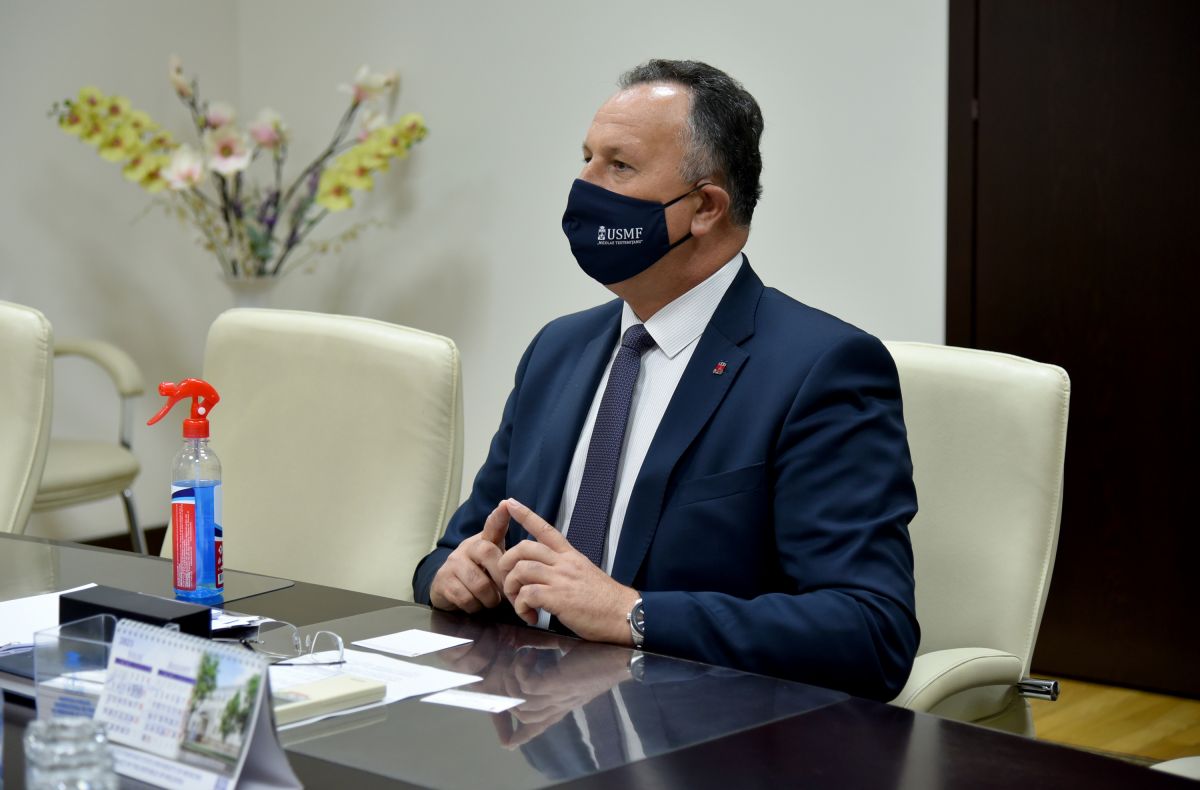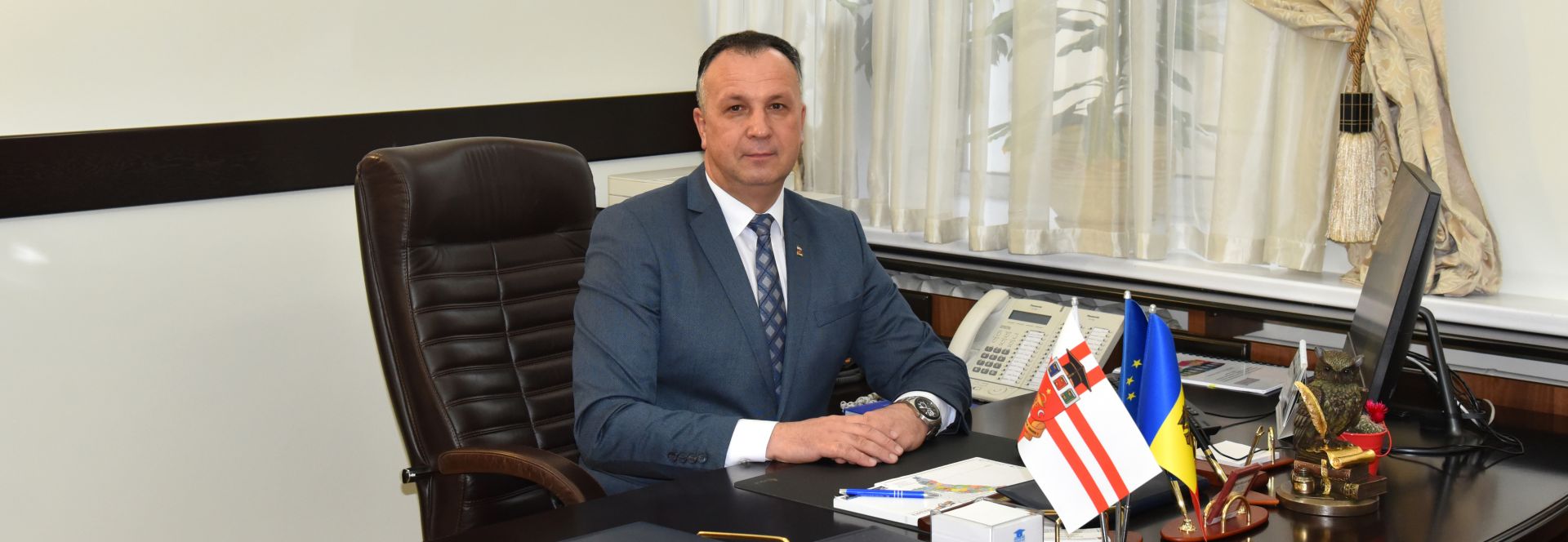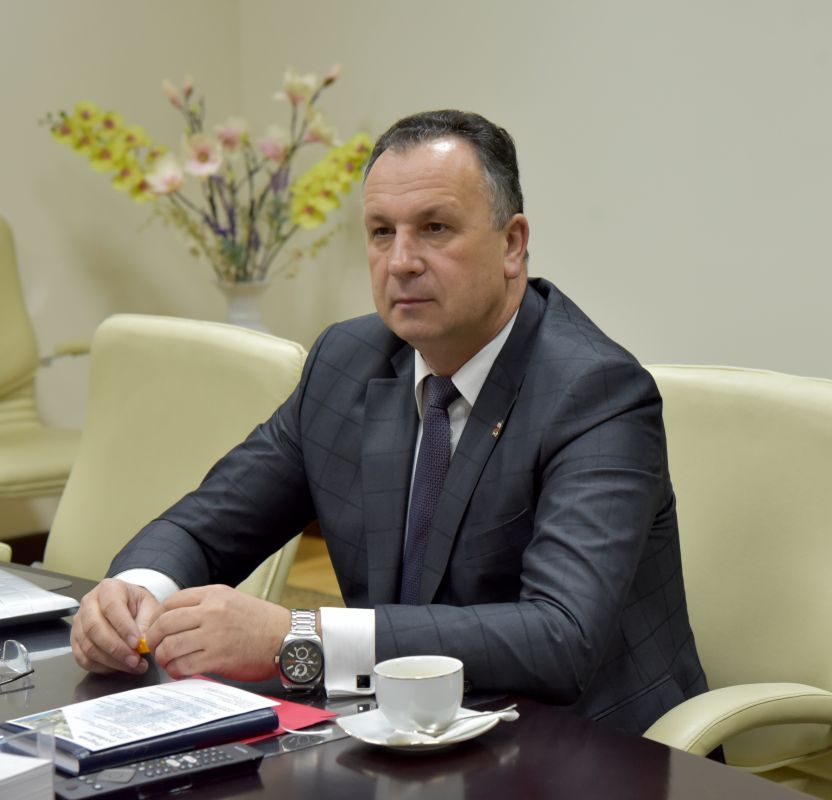Rector Emil Ceban: ”I want people to freely fulfill their duties without any direction and without feeling any pressure”
- 1497 vues

- Dear Mr. Rector, this autumn marks two years since you took the helm of Nicolae Testemitanu State University of Medicine and Pharmacy. How would you describe this first period?
Emil Ceban: It was difficult and easy at the same time. These two years passed very quickly, but I had enough time to understand how to proceed and act in certain situations and where to place emphasis. We have faced some rather complicated situations that have required additional efforts, others are still pending and we are trying to find solutions. These include the admission of international students, the activity of dental clinics etc. Indeed, for me, the last two years have been more intense, because the position of rector is complex and involves maximum attention and responsibility, a lot of courage, ambition and tens of hours spent in the office at the expense of the family.
The position of manager implies, first of all, a great responsibility. As leader of this prestigious university, I try to have a correct approach to each employee, based on the principles of meritocracy and performance, and first of all on humanity.
Of course, at the beginning I intended to tackle all professional areas of activity. I had clear ideas, many projects that I wanted to implement, but the epidemiological situation made me give up part of my aspirations for the time being. In addition, due to the COVID-19 pandemic that hit us, the requirements to be met by a higher education institution with medical and pharmaceutical profile have almost doubled.
- What are the priorities in your activity for the next three years, according to the Strategic Plan, based on the actual state of affairs?
- Indeed, the first priority would be the establishment of a University Hospital. Although we do not have the necessary support, we will work to this end, as we have been assured by our partners that they would lobby the European Commissioners in order to benefit from external funding for carrying out this project. In the absence of a modern university hospital, we will be limited in the development of university clinics and medical specialties, we will not be able to train highly qualified specialists according to international standards.
Currently, Nicolae Testemitanu University is one step ahead of the health system. We are a modern university that offers students optimal conditions for medical training and various opportunities for professional and personal development. Students acquire the necessary skills on molds and develop their practical abilities with the help of high-performance simulators, after graduation being disappointed with conditions, infrastructure and equipment when they go to work in medical institutions throughout the country. Therefore, many of them are no longer in the health area and it’s just unfortunate that this had to happen. For the continuous development of the health system and alignment with global requirements, it is necessary to involve state authorities.
Another priority is the development of the National Institute for Health and Medical Research, which is also a pressing need. Currently, both medicine and higher medical education cannot be developed without research, which has also become a criterion for the remuneration and promotion of university staff. Previously, research was concentrated only at the Academy of Sciences of Moldova. Now we are trying to implement the principle of education through research, to create this research structure – with high-performance laboratories for all forms of education. The COVID-19 pandemic has shown us that we need more research labs. A university scientific center must have a virus sequencing and medical genetics laboratory, a biobank – all concentrated at the University. Furthermore, during this period, I have initiated research projects with foreign partners, and I have extended some of the ongoing ones.
We can achieve this, since we have also launched the Master of Science program in Molecular Technologies in Health to train young staff for research work in these laboratories. Young researchers are doing internships abroad, foreign experts are giving lectures to our students – future doctors – and we are gradually developing modern university science, which we will also implement at the country level. The creation of the University Hospital will be an integral part of this process, we will be able to concentrate here the joint databases about patients, we will carry out scientific investigations, and the results can be applied in extensive research, which in turn will allow an improvement of diagnostic, treatment and prophylaxis schemes, etc.
The third priority is internationalization. Curricula must comply with European nomenclatures in order for our students to be trained according to contemporary requirements. We have already taken the first step in this direction by reducing the length of the semester from 17 to 15 weeks, in line with EU curricula. The number of hours in the humanities has also been reduced, as we need to be competitive so that graduates can work anywhere in the world. At present, the processes of urbanization and globalization do not allow us to retain them in the country, so we must offer them high quality studies and appropriate conditions, and the state must provide young doctors with decent salaries and good working conditions, to invest in equipment and build modern hospitals. In accordance with the provisions of the Strategic Plan, we want to expand and diversify the educational offer.
- You mentioned that for the continuous institutional development you need support from the state authorities. Has political instability influenced the University's activity in recent years?
- We all wanted a change and we have high expectations from the current government. At the same time, we are aware that in order to change the way things are in our country, we must all contribute. Nicolae Testemitanu State University of Medicine and Pharmacy has a valuable human potential and can provide support through everything it knows best, without reaping political dividends or anything in return. We want to be seen as a force, an efficient resource in solving many problems in the country in the areas of medicine, pharmacy, dentistry and public health in general. We just want to be heard and be useful in various fields - quality education, research, and healthcare.
- What other achievements can you list as a result of correct and assumed decisions?
- The Quality Management System of the University has been recently evaluated, the higher education program and the master's degree program in Public Health and the continuing professional education program in Psychopedagogy for teachers have been accredited at national level. In addition to the existing undergraduate degree programs in Optometry, Nursing, Public Health and Radiological Technology, recently, at the Senate meeting, we approved the initiation of the undergraduate degree program in Physiokinetotherapy and Rehabilitation and master's degree programs (cycle II) in Human Nutrition, Optometry and Visual Sciences, as well as Public Mental Health. We want to open new specialties and expand the Nursing program within a Moldovan-American partnership, in order to become attractive for other states as well.
We have carried out many of the planned activities, but the most important thing is that we have not incurred wage arrears. We managed to save on energy, water and gas bills during the isolation period, when we closed the hostels, some study blocks, and asked a certain category of employees to temporarily stop their work. We applied a clear methodology for calculating salaries, on which we worked for almost a year and we can say that we were successful.
Other achievements related to expenses include the outsourcing of sanitation services (household waste and maintenance of special cars, fuel) and hostel cleaning. We optimized the activity of the University's guards and snack bars, the food departments, which had a great deficit of 2.5-3 million lei. The greatest problem remains the COVID-19 pandemic, which allows us to carry out activities only with certain restrictions.
- In recent years there has been a low demand for further studies through residency from University graduates. What would be the reasons?
- I think that the main reason would be the remuneration of work. A resident doctor has a scholarship which is worth 1000 lei, plus a salary of 5 thousand lei, while in Romania a resident's scholarship is 1500-2000 euros, depending on the specialty and the year of studies, plus a pay supplement for services provided according to the curriculum, type of hospital, activity on holidays and weekends, etc.
Another factor is that our young people are well trained as specialists, and the best ones go to Romania. In recent years, this trend has increased.
Workplace conditions also play an important role in keeping doctors in office in the country. However, we know that medical institutions in many district centers and villages are in a deplorable state. Young doctors, accustomed to decent living and working conditions in Chisinau, face a lack of high-performance equipment, infrastructure, internet connection and low remuneration in the territories. Of course, this discourages them.
This is a systemic issue because the University is not the only one responsible for the future of young specialists. Together with the country's leadership and local public authorities, we need to increase salaries, equip and build modern regional hospitals and clinics - to develop the health system so that it becomes attractive to all young people, otherwise more graduates will go abroad.
- The public health crisis has revealed several deficiencies in the medical system. Do you think that during this period there has been laid more stress upon doctor’s role in society?
- Doctors should be much more respected. In other countries, for example, a doctor is addressed Mr. Doctor, regardless of age, thereby showing respect. Less so here. Even in the public space are shown more cases of scandal or conflict between doctor and patient rather than successful examples. Unfortunately, negative and sensational things prevail in society, while positive and remarkable results obtained by specialists remain in the background and are not fully appreciated.
- You have a busy daily schedule, which activities bring you the most satisfaction?
- I try to enjoy all the things I do, but work meetings with students, resident doctors, PhD students and colleagues give me the greatest satisfaction. I love people in general.
- What activities are taking up too much of your time?
- I have grown as a specialist at this university, it seemed to me that I knew everything, but it was not always the case. Problems arise that need to be addressed. Issues related to the teaching process, when performance does not meet our expectations, or there is no discipline, are quite exhausting. We have never focused on check ups, but on assessing the state of affairs, identifying the causes and the way to improve the situation. Secondly, I believe that people need to feel free and fulfill their duties without any pressure or direction.
We are concerned that for the 27 national scientific projects won under the State Program, we did not receive 12.5 million lei last year and 13 million this year. Without sufficient financial resources, you cannot conduct research…
I try to get used to the role of opening events, and to overcome my emotions. I appreciate the event itself - either webinar or conference - for its scientific and didactic contribution.
- How do you manage to combine the position of rector, which is very demanding, with that of professor and urologist?
- Unfortunately, I'm not very good at it. Initially, in the first year, I gave lectures, I had students, I also performed surgeries. At first - once a week, then once every two weeks, once a month, I also offered consultations, but in the end, I was not able to effectively combine all these activities. The role of rector is so complex that it does not allow you to be ubiquitous. As a result, however, it affects the department's staff, disciples, PhD students and, respectively, I have fewer publications. In order to come up with a good publication, you have to get inspiration, read a lot, monitor every novelty, work with the primary material, and as rector I can only get down to it in my spare time or late at night. However, during this period, together with my colleagues, I have developed a urology textbook and two monographs, one of which is being published.
- How do you restore your energy levels and deal with stress?
- For the most part, family is the place where I find peace and harmony, which gives me the strength to stand up and overcome any obstacle. During the holidays, I relax at home through physical work - mowing the grass, taking care of flowers, and planting trees. Likewise, activities at the department inspire me and provide me with a creative and innovative work environment.
At the department, we have a united team, we meet once a month and discuss achievements, projects, plans, and analyze reports for scientific conferences to be attended. Unfortunately, for the past two years, I have not been able to do sports because of my busy schedule, but I have promised my family that I will start soon.
- What is your source of inspiration and motivation for everything you accomplish?
- As a person, rector and doctor, I find the source of inspiration in people, in the team I work with, in young people and doctoral students, and my family offers me the support and motivation to do my best and develop continuously both professionally and personally. In fact, my daily work gives me inspiration and prerequisites to achieve together with members of the university community the objectives and actions proposed to increase the quality of higher medical education, research and innovation, healthcare…, because all these have a beneficial impact on people’s health and society in general.
- If we could turn back time, would you participate in the competition for the election of the rector?
- I wished for this position, I have to admit. Since you know your job well and have the ability to accomplish something, you feel empowered to move mountains. As a rector I have adjusted, but somewhere I feel like my hands are tied, sometimes discouraged. I am not clinging to this position, I believe that a person’s qualities are more important than his/her position, and not the other way around. I can't say that I have advantages, on the contrary - more responsibilities. At first, I was afraid that I would not be able to meet the demands of my team that I would not be able to work with some people, but I was wrong, as our employees are well educated due to the academic environment. Now I feel free, because the working mechanisms applied in the University, including by my predecessors, are in place. In the last two years, we have enrolled more students, we have launched new programs, we have changed the nomenclature of specialties so that the University can be competitive. I'm honored to lead a great team, but there are things that don't depend only on us. I am sure that together we will achieve everything we set out to do.
- At the end of the year, what message do you want to send to the academic community on the occasion of winter holidays?
- Dear colleagues, dear young people, I want to thank you for your work and dedication in carrying out the mission of Alma Mater, for your support, understanding and patience. I appreciate and respect each of you.
May this New Year bring faith and light into your souls. May these winter holidays bless you and your family with health and hope, love and prosperity, new professional projects and personal achievements!
Happy holidays!
Preluarea informației de pe site-ul USMF „Nicolae Testemițanu” poate fi efectuată doar cu indicarea obligatorie a sursei și a linkului direct accesat pe www.usmf.md.



Comentarii